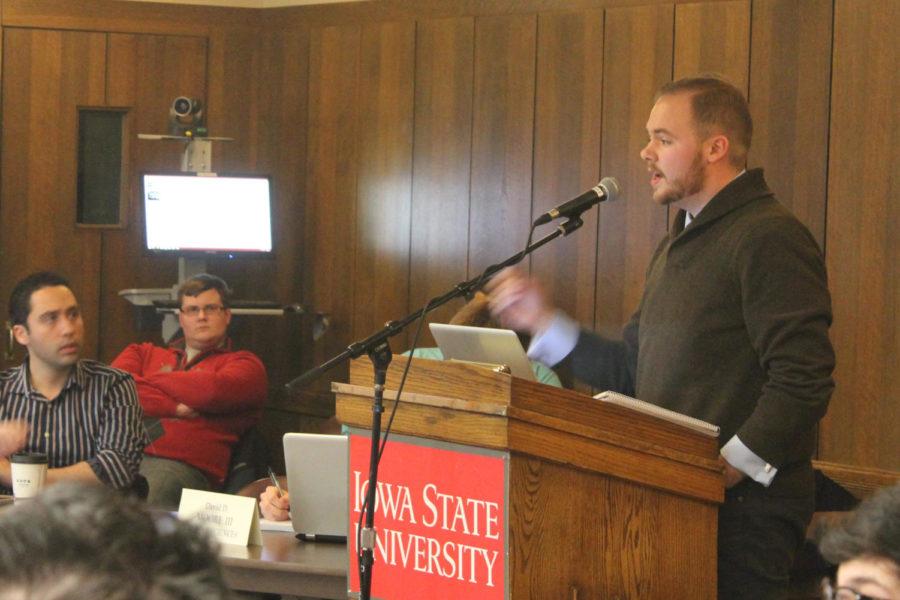GSB provides resolution to ban e-cigarettes on campus
Jonathan North/Iowa State Daily
Nathan Davis, senior in food science and global resource systems, addresses senators. Davis is a member of the Story County Policy Prevention Board. He spoke on the resolution to ban e-cigarettes on campus.
February 5, 2015
The Government of the Student Body will send a resolution to university administration to encourage banning the use of electronic cigarettes and nicotine delivery systems on campus as a preventative measure.
Nathan Davis, senior in food science, and the Health Promotion Club conducted a survey as a member of the Story County Policy Prevention Board to see if Story County residents felt that e-cigarettes are harmful and should be banned. Davis asked GSB to consider banning e-cigarettes on campus.
While the e-cigarettes — which are tobacco free and work by using vapor that is created from a heated liquid in the e-cigarette chamber — do not have as many harmful chemicals as traditional tobacco cigarettes, Davis said they still contain harmful carcinogens and have not been approved by the Food and Drug Administration.
Davis also said the amount of concentrated nicotine in the chambers of the e-cigarette often leak, which can then pose as poisonous harm to students on campus who may come in contact with the nicotine.
Davis said he conducted a survey of Ames residents, Ames High School students and ISU faculty to see how they felt about e-cigarettes. The majority said they wanted to limit their exposure to e-cigarettes, Davis said.
Speaker of the Senate Gabe Walsh and other senators said there is not enough scientific research about the e-cigarettes to determine whether they should be banned on campus until a later GSB Senate meeting. Walsh also said the Senate needs to reconsider the bill at the next meeting because they have not had time to hear students’ feedback on the issue.
Other senators said the majority of those in Davis’ survey would not be affected by the banning of e-cigarettes on campus because many who were surveyed were not ISU students.
“This is a preventative measure,” Davis said. “We’re concerned about Iowa State students; we’re concerned about the City of Ames. It could potentially be harmful to our constituents.”
Sen. Megan Sweere said there are students who have noticed their classmates smoking e-cigarettes in classrooms and found it distracting.
Sweere said the use of e-cigarettes would have the same effects as the use of tobacco cigarettes. Either way, smokers would congregate in areas on campus, making a portion of students feel uncomfortable and prevent them from easily moving through campus.
“Right now, e-cigarettes might be not used on campus, but that might just be because students think they can’t use them now anyway,” Sweere said.
Sen. Richard Hartnett agreed, saying it is obvious that there is enough scientific research on e-cigarette use, but that the use impedes students’ ability to get a good education because e-cigarette use is distracting.
However, some said because e-cigarettes are much less carcinogenic than tobacco cigarettes and aid tobacco smokers in quitting smoking, they should be allowed. If e-cigarettes are banned, e-cigarette smokers would revert to sneaking tobacco on campus, a practice they said is still happening.
A few senators said there is not enough research to say e-cigarettes are harmful.
“In the medical field, you don’t give the benefit of the doubt to the drug,” said Sen. Neil Vezeau on e-cigarettes’ harmfulness.
Sen. Ryan Starn agreed.
“Iowa State is not a night club; it’s not your home,” Starn said. “Iowa State is a place of academia. Smoking is smoking. It doesn’t matter what is in them.”
The banning of e-cigarettes is a preventative measure that would stop a possible overuse of e-cigarettes on campus if students realize they are allowed on campus now, senators argued.
There could also be negative stereotypes about smokers that would discourage visitors and alumni from returning to campus if they see students smoking publicly, some said.
GSB will send a resolution banning the use of nicotine delivery systems for the administration’s consideration.

















